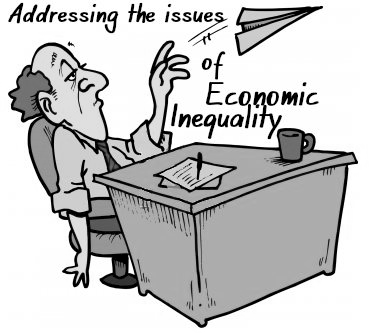0 Who is addressing economic injustice?
- Society
- by Adrian Mark Dore
- 14-10-2023

We are all aware, either explicitly or intuitively, that our economy no longer serves the majority, only the rich. This is a serious problem. Given its seriousness, who’s addressing the problem? You presume some capable and knowledgeable organisations have picked up the baton on our behalf. True, some organisations are tasked with this objective, but are they making any progress, or are they part of a plan to mislead us? Are they helping or delaying our progress towards a more equitable economy?
It all sounds a bit far-fetched and conspiratorial to suggest there’s a plan to mislead us but first consider this.
We all know economic inequality is growing exponentially. The rich are particularly aware of this and of the difficulty of concealing it from the majority. Therefore, what can they do, considering they want nothing to change but don’t want the majority alarmed by their massive wealth increase?
They form organisations to “champion greater economic justice.” They point to these organisations and say, “you see, we acknowledge the problem and are investing in making changes.” This, of course, is just a PR programme to mislead people into thinking the rich and influential are concerned and addressing the problem when they are not.
This is how the wealthy tackle obvious problems that can’t be denied or brushed under the carpet. They create organisations with false agendas and publicise them as “working towards a solution” while doing nothing. They used the same approach to hide the fact that the Accounting Model as a business measurement standard is inadequate and inappropriate. (See my article “Economic Apartheid is caused by the Accounting Model” for more details.) They set up numerous organisations tasked with finding a “solution.” These organisations make a pretence of being busy while doing nothing. They hold annual conferences, calling on the rich and powerful to attend while talking nothing but rubbish. It’s similar to the World Economic Forum’s annual Davos meetings, except these organisations focus on their particular subject. Davos sprouts general economic rubbish. It’s all based on the same PR platform of “talking the good talk while doing nothing.”
Returning to economic inequality and the organisations supposedly "fighting for change," I will present you with certain facts and let you judge whether or not they have done anything.
Our economy is run (mainly) following the principles of free markets, based on Milton Friedman's "Shareholder Theory". This states that the sole purpose of business is to create shareholder value. You now know why the rich have everything and the majority struggle.
In 1984 Edward Freeman proposed "Stakeholder Theory." Stakeholder Theory argues that businesses perform better over the long term when they serve all stakeholder needs - providing a balanced approach to development. However, thirty-nine years later, we are no further forward in adopting a more balanced approach than the day Freeman announced his beliefs. This shows the abject level of greed and short-sightedness which exists. When somebody holds the purse strings, they will not let go of them, despite knowing somewhere in the recess of their brain that a fairer and more balanced approach will be better for everybody in the long run.
Some argue that I am wrong and that many businesses have adopted a "Stakeholder" approach. This is entirely incorrect. The only businesses which can afford to adopt a stakeholder approach are privately owned and funded businesses. This is because Shareholder Theory is institutionalised into our economy through our measurement standard. Our business measurement standard is based on financial measures, which place short-term profit creation for shareholders at the core of everything they do. All other measures are ignored because they are not universally comparable. They are valueless. All listed companies and those seeking external investment and credit must produce strong financial results to attract investment and borrowing. To improve their financial results, they rob stakeholder value to attract investors and get the lowest borrowing rates. Therefore, only businesses not seeking external financial support or not already reliant on it can adopt a stakeholder approach. That means very few businesses.
Therefore, if you are going to change from Shareholder to Stakeholder Theory, you will have to replace existing measurement standards with a fully inclusive, balanced, and comparable measurement standard. This will stop businesses from robbing stakeholders to bolster shareholder results, as a complete picture of business performance will be presented and audited. Not a partial and one-sided picture.
With the above understanding in mind, are any organisations "fighting for greater economic equality" calling to replace our inadequate and inappropriate measurement standard. This is the most fundamental issue facing them. These organisations know Shareholder Theory is institutionalised into our economy through our business measures. Therefore, introducing more balanced measures is the only way to address the problem. Measures that look after all stakeholder and shareholder needs, and are universally comparable.
I pointed this out to two of the most prominent "economic equality" groups - "Inclusive Capitalism" and "Conscious Capitalism" some years ago. However, this does not appear on their agendas in a clear and unequivocal way, such as, "We require a complete revamp of our business measurement standard as the most critical step in ensuring a balanced economy." You can only make business more "inclusive" or "conscious" of another stakeholder's needs when you measure and manage them effectively. If any organisation is serious about addressing inequality, they should plough all their efforts and resources into looking for an alternative measurement framework. Unless we change what we measure and manage, nothing changes. If they are not doing this, I can only assume they are not looking for a solution, only pretending to do so. You be the judge.
Where does that leave us? On our own, but at least we are no longer deluded about who is supporting and misleading us.
You may read other articles by Adrian Dore on Medium at